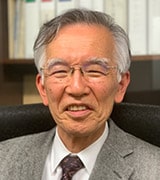Our Program
NAGANO Hiroshi
Profile

Visiting Scholar, National Graduate Institute for Policy Studies
- In 1971,
- Faculty of Science and Technology, Keio University
- In 1973,
- Faculty of Law, Keio University
- In 2001,
- Deputy General Manager, Engineering Headquarters, Kajima Corporation
- In 2002,
- Director General for International Affairs, Ministry of Education, Culture, Sports, Science and Technology
- In 2004,
- Director General, National Institute of Science and Technology Policy
- In 2006,
- Board of Directors, Japan Science and Technology Agency(JST); Principal Fellow, JST Center for Research and Development Strategy
- In 2007,
- Professor, National Graduate Institute for Policy Studies
- In 2011,
- Chairman、OECD (Organization for Economic Co-operation and Development) Global Science Forum (GSF)
- In 2015,
- Guest Professor,?Keio University (Visiting professor from 2016), Chairman, Japan Society for Research Policy and Innovation Management,
- In 2017,
- Senior Executive Director The Engineering Academy of Japan.
- Books:
- "Learning Science and Technology Policy from Germany" (single author, Kindai-kagakusha, 2016)
- "Training the Next Generation of Leaders for which the world is competing" (single author, Kindai-kagakusha, 2013).
- "Priority-Setting in Japanese Research and Innovation Policy" (Co-author, VINNOVA, 2009)
- Editorial "New Cooperation in East Asia" (co-author, Science 2007), Fellow, American Association for the Advancement of Science (AAAS)
Expectations for the Program
While the world is struggling to cope with the novel coronavirus disease (COVID-19), there is no doubt that the system of society after the COVID-19 will have very different values from those of the past in both the world and Japan. In conjunction with the rapid progress of digital transformation, an unexpected transformation in our behavior is on its way and will become a reality. If we cannot change the people’s mindset, Japan's recognition in the international community will become increasingly limited. In the face of dramatic social changes that are causing a third revolution, following the Meiji Restoration and the defeat in World War II, the nation's policymaking system that links the people with the executive branches and the legislature is undergoing a major transformation.
In the midst of an unusual transformation, this project calls for the development of new methods to make the policymaking process more evidence-based and the implementation of research results into actual policymaking processes. Through these activities, I have high hopes that policy making in Japan will become more accessible to people and there will be momentum for the bottom-up policy making. If this becomes the norm, we can proudly say that democracy has taken a permanent place in Japan.




